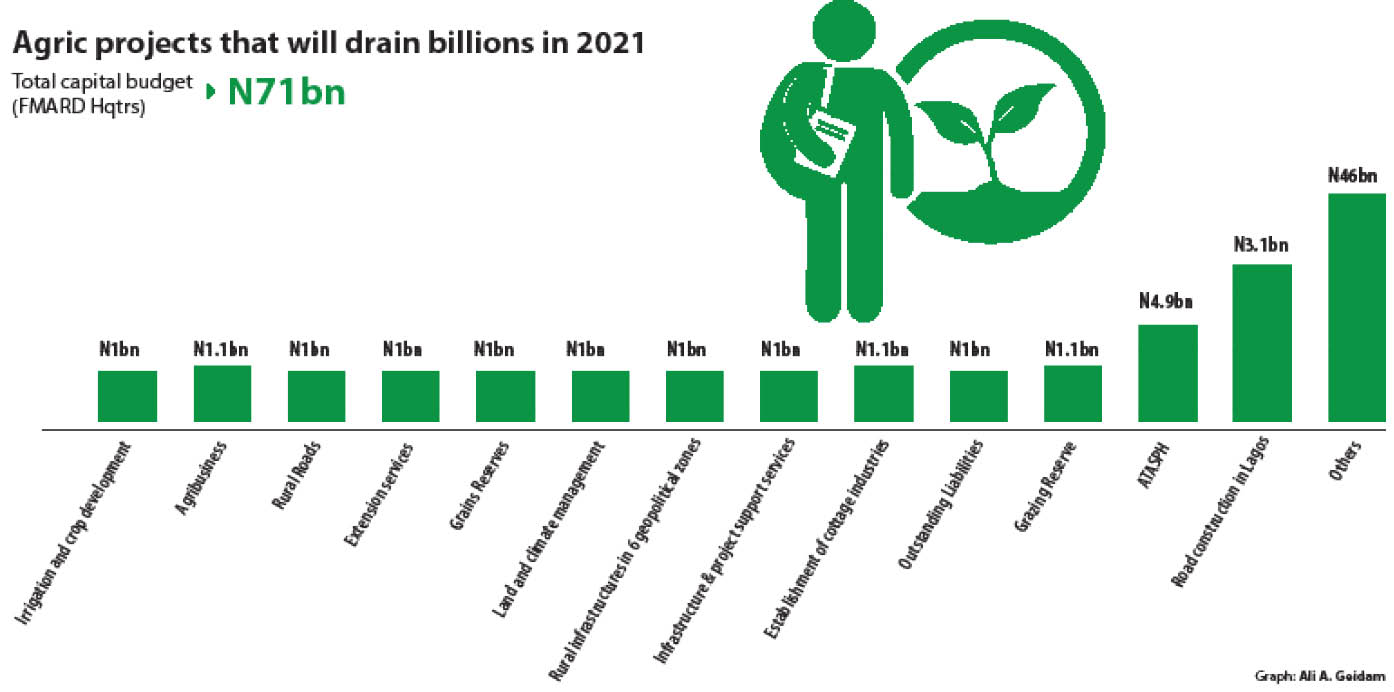The total budgetary allocation to the agricultural sector, which includes the Federal Ministry of Agriculture and Rural Development and its 43 agencies, is about N280.415 billion.
Out of the amount, recurrent expenditure for the ministry and its agencies takes about N69.2 billion while capital expenditure will gulp N211.077 billion.
- It was painful watching 6 sets graduate ahead of us—KASU’s best medical student
- Military airstrike kills scores of terrorists in Borno
The figure represents less than one per cent of the nation’s budget of N13.5 trillion and grossly falls short of the July 2003 Maputo Declaration for African countries to allocate at least 10 per cent of their national budgets to agriculture.
The parent ministry, which is the engine room of the sector, has a paltry N71 billion to implement all its capital (both new and ongoing) projects for the 2021 fiscal year.
Many observers believe this does not speak well of a nation that seeks to strengthen its agro-economy that hinges on diversification and self-sufficiency in its major food items.
The ministry, which shoulders two responsibilities of developing agriculture and rural communities in the country, has accorded more prominence to certain projects, which experts like Mr Akomuye John, an agricultural economist, consider a misplacement of priorities.
One of such projects is the N3.5 billion completion of Epe-Ketu-Itoikin road and bridge construction in Lagos, which is a new project of the ministry. It is one of the third highest projects that will take such an amount in the capital expenditure.
The highest is the N5.005 billion project tagged ‘Rural Infrastructure Development in six Geopolitical Zones’, among their ongoing projects.
This is apart from the N1 billion budgeted for the construction of selected rural roads within Nguru/Machina/Yusufari/Jakusko/Bade and Karasuwa LGAs in Yobe State and N900 million for the construction of rural roads in selected states.
The second highest in their menu is a N4.948 billion project known as the Agricultural Transformation Agenda Support Programme – PHASE 1.
This is a new project in the ministry though it has been running in the last five years. The programme is a multilateral and bilateral project funded by the federal government and the African Development Bank (AfDB).
With regard to the country’s Food and Strategic Reserves, the ministry intends to spend only N1.003 billion. This is less than what was spent on it last year (N1.4 billion).
With the lessons learnt from the high cost of food witnessed during the first wave of the COVID-19 and the apparent lack of good quantity from the silos to cushion rising prices, one would have expected more in the budget to stock the country’s food reserve to avoid a repeat.
The country has 33 silos with a total capacity of 1.3 million metric tonnes, although about 19 have been concessioned to the private sector. However, most of the silos are empty.
Last year, the food reserve had less than 15 per cent of the total capacity of the silos – a situation that made it very difficult for the government to intervene in the grains markets as prices hit the roof.
In livestock development, which will assist in mitigating the devastating herders-farmers conflicts, the federal government has reduced the budgetary allocation to the National Grazing Reserves Development from N1.6 billion last year to N1.084 in the 2021 financial year.
Even the National Livestock Development Plan champion by the presidency has not seen any significant light since 2019, leaving the subsector stagnant.
The attempt by the Central Bank of Nigeria to intervene in the subsector is creating more crises between the multinational big players and the small scale players in the country.
On grains, however, with flood incidents, drought and shortage in major grains in 2020, experts have called for more focus on irrigation to mitigate the shortfall in supply.
Government plans to spend only N1.032 billion on irrigation and crop development as part of its ongoing projects.
Last year, the Livelihood Improvement Family Enterprise (LIFE), designed to help women and youth in the rural areas, gulped N1.01 billion.
This year, a total of N1.024 billion is budgeted for the establishment of cottage industries through the programme.
Other projects that will take one billion Naira each from the ministry’s coffers this year include the payment of outstanding liabilities (N1 billion), land and climate management, extension services ongoing (N1.014bn), agribusiness and market development (N1,095bn) and infrastructure and projects support services (N1,040bn).
Apart from these projects, there are others that will consume hundreds of millions in 2021 and they include among others, engineering and mechanization (N840m), counterpart funding of agricultural projects with donor agencies (N828m), development and implementation of national fertilizer quality control programmes (N747m) and promotion of rice production for self-sufficiency and import substitution (N734m).
A look at other proposed spending indicate that policy coordination, projects/programmes monitoring and evaluation will take N706 million; provision and installation of solar street light nationwide ongoing N720m; promotion and development of cashew value chain N550m; promotion and development of sesame/acha value chain N542 million; promotion and expansion of oil palm production towards self-sufficiency and import substitution in 24 oil palm producing states N442m; and National Soil Sampling and Mapping N450m.
Besides the projects above, there are hundreds of others the ministry hopes to make an impact on this year if it achieves at least 90 per cent budget release. Until that happens, the journey to a better agricultural sector is still far.

 Join Daily Trust WhatsApp Community For Quick Access To News and Happenings Around You.
Join Daily Trust WhatsApp Community For Quick Access To News and Happenings Around You.



